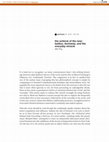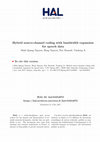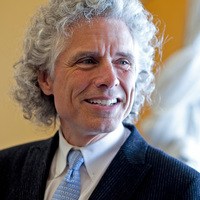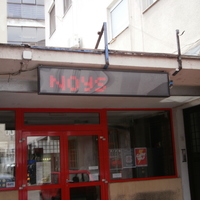Books by Alex Ling

Bloomsbury Academic, 2021
We live in scandalous times. Every day some new controversy demands our attention, our emotional ... more We live in scandalous times. Every day some new controversy demands our attention, our emotional investment, and, ultimately, our judgment. Many of these routine transgressions will be understood in ‘revelatory’ terms, as peeling back the multiple layers of artifice and spin to reveal an underlying, and oftentimes disturbing, ‘truth’. Others will be recognized as calculated marketing exercises that simply present the strategic face of contemporary capitalism.
Yet these ‘ordinary’ scandals can themselves be seen to be largely derivative of another, altogether more fundamental—and fundamentally rare—form of disruption. Such is the real scandal that accompanies instances of authentic creation. Building on the philosophy of Alain Badiou, Scandalous Times not only argues the case for such ‘real scandal’, but also shows how it is today being abrogated and substituted through the increasing production of novel forms of state-sanctioned controversy.
From Duchamp to Donald Trump, Scandalous Times explores the ways in which areas from art and advertising to politics and social media have come to actively contribute to this ‘static’ fabrication of controversy, all the while arguing for the need to rethink creativity as a radical exception to the state, and not its proxy.
“Alex Ling presents a powerful argument on the nature of scandal and pseudo-scandal today through a concise and lucid account of Alain Badiou’s theory of being and the scandalous event that occasionally irrupts within it, allowing for the possibility of real change. This is a truly striking demonstration of the extraordinary potential of Badiou’s thought for critical theory and cultural studies. It should be studied for its exemplary methodology as much for its original readings and conclusions.” Kenneth Reinhard, Professor of Comparative Literature and English, University of California, Los Angeles, USA
“Alex Ling’s Scandalous Times is a lucid argument that the realm of contemporary scandal is one in which everything changes so everything can stay the same. Against this conservatism, Ling provides a philosophical defence of the real scandal that would overturn our scandalous reality.” Benjamin Noys, Professor of Critical Theory, University of Chichester, UK
“Alex Ling turns a much needed philosophical gaze on scandals, one of those key yet widely misunderstood concepts currently shaping our reactionary political age. Ling’s lucid, challenging and thoroughly engaging analysis forces us to think of our current political moment as one saturated with ‘simulacral scandals’ (or state-sanctioned controversies), both perversely satisfying an inevitable demand for shock and horror in times such as ours, and precluding any real change. Building on Badiouian philosophy, this timely and powerful book is not just a sharp and original account of how to think about scandals and the role they play in our societies, but a guide for how to reimagine them, and explore ways towards new political horizons and ultimately ‘the possibility of real happiness’.” Aurelien Mondon, Senior Lecturer in Politics, University of Bath, UK

I.B. Tauris / Bloomsbury Academic, 2017
He has been regarded with suspicion by some, as an anti-postmodernist who dared to write about un... more He has been regarded with suspicion by some, as an anti-postmodernist who dared to write about unfashionable concepts such as truth and meaning. But in recent years, the philosopher Alain Badiou has risen in prominence, pioneering new ways to produce, conceptualise and discover art. Badiou Reframed is an original book about an original thinker which applies – for the first time – Badiou's philosophy to the visual arts. The six central concepts of this philosophy – 'being and appearing', 'event and subject' and 'truth and ethics' – are elucidated through detailed analysis of a range of visual artworks, including Marcel Duchamp's readymades, the abstract paintings of Kasimir Malevich and Mark Rothko, Banksy's contemporary street art, the sculpture of Alberto Giacometti, Stéphane Mallarmé’s visual poetry and Victor Fleming’s classic film The Wizard of Oz. In focusing on Badiou's critical relationship with the visual arts, Alex Ling reinterprets and represents not only the man, but art itself.
Chongqing University Press, 2021
Chinese language translation of 'Badiou Reframed'
Bloomsbury Academic, 2014
In Mathematics of the Transcendental, Alain Badiou painstakingly works through the pertinent aspe... more In Mathematics of the Transcendental, Alain Badiou painstakingly works through the pertinent aspects of category theory, demonstrating their internal logic and veracity, their derivation and distinction from set theory, and the 'thinking of being'. In doing so he sets out the basic onto-logical requirements of his greater and transcendental logics as articulated in his magnum opus, Logics of Worlds.
Previously unpublished in either French or English, Mathematics of the Transcendental provides Badiou's readers with a much-needed complete elaboration of his understanding and use of category theory. The book is vital to understanding the mathematical and logical basis of his theory of appearing as elaborated in Logics of Worlds and other works and is essential reading for his many followers.
Edinburgh University Press, 2011
Alex Ling seizes upon the philosophy of Alain Badiou to clarify a central question in film schola... more Alex Ling seizes upon the philosophy of Alain Badiou to clarify a central question in film scholarship: ‘can cinema be thought?’ Treating this question on three levels, the author first asks if we can really think what cinema is, at an ontological level. Second, he investigates whether cinema can actually think for itself; that is, whether or not it is truly ‘artistic’. Finally he explores in what ways we can rethink the consequences of the fact that cinema thinks. In answering these questions, the author uses well-known films ranging from Hiroshima mon amour to Vertigo to The Matrix to illustrate Badiou’s philosophy as well as to consider the ways in which his work can be extended, critiqued and reframed with respect to the medium of cinema.
Book Chapters and Journal Articles by Alex Ling
Journal of Continental Philosophy, 2022
By Aristotle's own admission, homonymy and amphiboly, or syntactic homonymy, are unlikely to be a... more By Aristotle's own admission, homonymy and amphiboly, or syntactic homonymy, are unlikely to be accidental features of the Greek language (nor of any language, nor of language as such), but rather a radical evil that can at best be subdued, through recourse to categories, for example. Or we could choose to follow the sophists and exploit it by aiming at an essentially sonorous consensus. But then such texts would constitute a radical evil for translation.

It is hard not to recognize — as many commentators have — the striking homology between Alain Bad... more It is hard not to recognize — as many commentators have — the striking homology between Alain Badiou’s theory of the event and the fate of Marcel Duchamp’s infamous 1917 ‘readymade’ Fountain. The congruence is in fact so marked that one of the easiest ways of grasping this key philosophical concept is simply by comparing it to Fountain’s simultaneously mundane and extraordinary story. Yet arguably the most important lesson to be drawn from this exercise is also the one that is most often ignored; to wit, far from presenting an unbridgeable divide, there in fact exists a paradoxical relation of continuity between the ‘event’ and the ‘everyday’. This article seeks to redress this critical oversight by using Fountain not only to ‘flesh out’ Badiou’s crucial concept but also to explore the frequently overlooked (but no less necessary) imbrication of the everyday in the event, and in this way counter claims that Badiou’s philosophy presents a straightforward or even naïve division betwee...
Climbers, 2021
The history of Western philosophy is in many ways a long love affair with the art of metaphor. Of... more The history of Western philosophy is in many ways a long love affair with the art of metaphor. Of these cherished rhetorical devices, few have proven as enduring, as powerful, and as versatile, as that of mountain climbing. Struggle and perseverance, exploration and adventure, possibility and limitation, corporality and transcendence, significance and futility; the image of the (often solitary) climber attempting to scale an unforgiving peak is one that just keeps on giving.

Journal of Continental Philosophy, 2020
Alain Badiou embarks on a close reading of Hegel’s Aesthetics to consider how his own recently-de... more Alain Badiou embarks on a close reading of Hegel’s Aesthetics to consider how his own recently-developed concept of the “index”—designating the crucial point of mediation between finite works and the absolute (or the means by which “works of art obtain their seal of absoluteness”)—might figure therein, as well as to explore what Hegel would have made of cinema, had he lived to experience it. After first examining the various ways that this “index of absoluteness” functions in the Hegelian conception of art—both according to its canonical forms (sculpture, architecture, painting, music, and poetry including theatre) and its historical classifications (classical, symbolic and romantic)—Badiou proceeds to investigate whether Hegel’s aesthetic system could and should have foreseen the eventual birth of cinema, together with its general characteristics; and whether this new development would ultimately refute or confirm his famous thesis on the end of art.
Journal of Continental Philosophy
In this text Cassin and Narcy begin their reassessment of the mode of thought that is sophistry, ... more In this text Cassin and Narcy begin their reassessment of the mode of thought that is sophistry, which has historically functioned as the (negative) “other” of classical philosophy. To this end, the authors first present a close reading of Book Gamma of Aristotle’s Metaphysics, understood as a concerted “strategy against sophism” that, in establishing a logical basis for metaphysics, seeks to relegate the former to the sidelines once and for all. What proves ineliminable in this operation, however, and which “resurfaces beyond metaphysics,” is discourse itself. Cassin and Narcy then set about exploring the contemporary resurgences of sophistry, first through the discourse of (novelistic) fiction, then, more rigorously, in the work of Jacques Lacan, whose own thought poses radical challenges to the relation of language to meaning

Alain Resnais’ cinema is as entwined with the question of time as are the lovers with each other ... more Alain Resnais’ cinema is as entwined with the question of time as are the lovers with each other in the opening scene of his and Marguerite Duras’ 1959 masterpiece, Hiroshima mon amour. Just as Hiroshima’s lovers are here disembodied and depersonalised in an anonymous embrace, so too Resnais’ cinema can be seen to establish its own anonymous time: a timeless time, a time which is paradoxically outside of time. Indeed, this is one of the more immediate ways by which we might understand Jacques Rivette’s famous observation, made at the time of Hiroshima’s initial release, that Resnais’ work constitutes “a parenthesis in time”. For the ‘parenthesis’ in question does not simply refer to Hiroshima’s ostensible circularity (whereby “at the end of the last reel you can easily move back to the first, and so on”) but highlights the film’s ‘timeless’ nature, its out-of-time-ness. It is this peculiarly ‘untimely’ aspect of Resnais’ cinema that I will examine in this essay, specifically with regard to his enigmatic (and equally circular) second film, L’Année Dernière à Marienbad (1961). Drawing on the philosophy of Alain Badiou and in particular his concept of the event, I will argue – contra Gilles Deleuze for example, who famously held that the film captures the idea of time itself – that the whole of Marienbad is in fact situated within a temporal rupture, in the ‘cut’ between two heterogeneous times, namely, a pre- and post-evental time. Or again, I will argue that the film’s ‘timeless’ nature results foremost from its presentation of what Badiou would call an ‘amorous event’.
Sanglap: Journal of Literary and Cultural Inquiry, 2018

Journal of Continental Philosophy, 2021
The brilliant Aspasia owes her fame to two men. She was the beloved and revered companion of Peri... more The brilliant Aspasia owes her fame to two men. She was the beloved and revered companion of Pericles, the most powerful and presti- gious Athenian of the city’s golden age (460–430 BCE), and the privileged and respected interlocutor of Socrates. Her position as a valued com- panion and recognised intellectual—exceptional in a city where custom dictated that silence and invisibility represented a woman’s greatest glory— was no doubt connected with her status as a metic (resident alien). This status, while denying her the right to become the legal spouse of the man whose life she shared, allowed her—at the risk of a somewhat sulphurous reputation—the freedom to be seen, to think, and to express herself. While the beautiful woman from Miletus has remained silent, if we assume that the insults she was showered with were essentially aimed at her lover, the leader of the democrats, the sources we have at our disposal allow us to study her relationships with Socrates and Pericles.

Journal of Continental Philosophy, 2020
The real invariably functions today as a means of intimidation and constraint. That we consistent... more The real invariably functions today as a means of intimidation and constraint. That we consistently fail to overcome this static conception stems from the fact that we do not know what the real actually is, nor do we know how to access it. To address this shortcoming, Badiou looks first to the well-known story of the death of Molière to show how all access to the real necessarily entails division-not only a division of the real from semblance, but also a division of the real itself. Staying with theatre, Ba-diou then turns his attention to Pirandello to pursue the idea that, since the real is always manifested within semblance, its exposure demands not simply that its "mask must be torn off as semblance," but moreover that "the mask itself demands that it be taken as real." Applying these principles to our present situation, Badiou proceeds to isolate the contemporary semblance of real capitalism-the crucial mask that needs to be torn off today as nothing other than democracy itself, noting that, as with all access to the real, its division will necessarily entail a measure of violence.

Translator's Introduction \ Preface \ Part I: Topos, or Logics of Onto-logy: An Introduction ... more Translator's Introduction \ Preface \ Part I: Topos, or Logics of Onto-logy: An Introduction for Philosophers \ 1. General aim \ 2. First definitions \ 3. The size of a category \ 4. Limit and universality \ 5. Some fundamental concepts \ 6. Duality \ 7. Isomorphism \ 8. Exponentiation \ 9. Universe 1: closed Cartesian categories \ 10. Structures of immanence 1: philosophical grounds \ 11. Immanence 2: sub-object \ 12. Immanence 3: elements of an object \ 13. 'Elementary' clarification of exponentiation \ 14. Logic 1: central object (or sub-object classifier) \ 15. True, false, negation and more \ 16. Central object as linguistic power \ 17. Universe 2: the concept of Topos \ 18. Ontology of the void and of difference \ 19. Mono., Epi., Iso., Equa., and other arrows \ 20. Topoi as logical places \ 21. Internal algebra of 1 \ 22. Ontology of the void and excluded middle \ 23. A classical miniature \ 24. A non-classical miniature \ Part II: Being-There \ Introduction \ A. Transcendental structures \ B. Transcendental connections \ B2. Of transcendental connections and logic in its usual sense (propositional logic and first order logic of predicates)\ B3. Transcendental connections and the general theory of localisations: topology \ C. Theory of appearing and of objectivity \ D. Transcendental projections: theory of localisation \ E. Theory of relations. The status of worlds \ Index

Hybrid digital-analog (HDA) architectures have been widely developed for efficient digital transm... more Hybrid digital-analog (HDA) architectures have been widely developed for efficient digital transmission of analog speech, audio or video data. By considering the advantage of both digital and analog components, HDA systems gain better performances than purely analog and digital schemes in a wide range of channel conditions. However, HDA systems described in previous works are mostly designed for continuous-valued sources. In this paper, we address the problem of transmission of discrete sources over noisy channels. In particular, our work focuses on digital speech data in PCM format. We proposed two analog schemes, linear mapping, and non-linear mappings. The linear analog mapping employs an equal error protection scheme while the non-linear mapping takes into account the heterogeneous nature of error values to provide better protection to important values. The experiment results show that our HDA systems provide a better performance on a wide range of channel qualities in comparison with traditional purely digital systems.

It is difficult to overstate the impact the British journal Screen has had on the discipline of f... more It is difficult to overstate the impact the British journal Screen has had on the discipline of film and television studies. For the past 50 years, the journal has consistently been at the centre of debates around how we watch, why we watch, and what all this watching actually means. Moreover, when it came to film theorising, Screen for a very long time set the agenda. Today the journal’s back catalogue reads like a rollcall of canonical, game-changing texts (1), and the most (in)famous fruit of this labour, so-called “1970s Screen Theory” – that curious mélange of Althusserian Marxism and Lacanian psychoanalysis (with just a dash of feminist theory) – remains an equally decisive and divisive point in film theory, marking either the height of activist political engagement with cinema and contemporary culture more broadly, or the nadir of rational film theorising, depending on your vantage point
In any case, as Badiou sees it, philosophy is obliged to engage with film for the very simple rea... more In any case, as Badiou sees it, philosophy is obliged to engage with film for the very simple reason that “cinema is a philosophical situation.” 14 The aim of this chapter is accordingly to consider Badiou’s understanding of cinema itself— taken in the generic sense as an art almost entirely defined by its relation to other arts (and nonart)— and draw out some of the more interesting artistic and philosophical consequences of his position.15 Following a brief examination of Badiou’s “inaesthetic” conception of art and its relation to truth and philosophy, we will move on to discuss cinema’s peculiar position among the arts before finally addressing some of the paradoxes Badiou’s understanding of cinema gives rise to, as well as some of the challenges it presents his philosophical system as a whole
Introduction to the special issue of Parrhesia which has developed from the 2013 Australasian Soc... more Introduction to the special issue of Parrhesia which has developed from the 2013 Australasian Society for Continental Philosophy’s Conference at the University of Western Sydney
Journal of Continental Philosophy
<jats:p />











Uploads
Books by Alex Ling
Yet these ‘ordinary’ scandals can themselves be seen to be largely derivative of another, altogether more fundamental—and fundamentally rare—form of disruption. Such is the real scandal that accompanies instances of authentic creation. Building on the philosophy of Alain Badiou, Scandalous Times not only argues the case for such ‘real scandal’, but also shows how it is today being abrogated and substituted through the increasing production of novel forms of state-sanctioned controversy.
From Duchamp to Donald Trump, Scandalous Times explores the ways in which areas from art and advertising to politics and social media have come to actively contribute to this ‘static’ fabrication of controversy, all the while arguing for the need to rethink creativity as a radical exception to the state, and not its proxy.
“Alex Ling presents a powerful argument on the nature of scandal and pseudo-scandal today through a concise and lucid account of Alain Badiou’s theory of being and the scandalous event that occasionally irrupts within it, allowing for the possibility of real change. This is a truly striking demonstration of the extraordinary potential of Badiou’s thought for critical theory and cultural studies. It should be studied for its exemplary methodology as much for its original readings and conclusions.” Kenneth Reinhard, Professor of Comparative Literature and English, University of California, Los Angeles, USA
“Alex Ling’s Scandalous Times is a lucid argument that the realm of contemporary scandal is one in which everything changes so everything can stay the same. Against this conservatism, Ling provides a philosophical defence of the real scandal that would overturn our scandalous reality.” Benjamin Noys, Professor of Critical Theory, University of Chichester, UK
“Alex Ling turns a much needed philosophical gaze on scandals, one of those key yet widely misunderstood concepts currently shaping our reactionary political age. Ling’s lucid, challenging and thoroughly engaging analysis forces us to think of our current political moment as one saturated with ‘simulacral scandals’ (or state-sanctioned controversies), both perversely satisfying an inevitable demand for shock and horror in times such as ours, and precluding any real change. Building on Badiouian philosophy, this timely and powerful book is not just a sharp and original account of how to think about scandals and the role they play in our societies, but a guide for how to reimagine them, and explore ways towards new political horizons and ultimately ‘the possibility of real happiness’.” Aurelien Mondon, Senior Lecturer in Politics, University of Bath, UK
Previously unpublished in either French or English, Mathematics of the Transcendental provides Badiou's readers with a much-needed complete elaboration of his understanding and use of category theory. The book is vital to understanding the mathematical and logical basis of his theory of appearing as elaborated in Logics of Worlds and other works and is essential reading for his many followers.
Book Chapters and Journal Articles by Alex Ling
Yet these ‘ordinary’ scandals can themselves be seen to be largely derivative of another, altogether more fundamental—and fundamentally rare—form of disruption. Such is the real scandal that accompanies instances of authentic creation. Building on the philosophy of Alain Badiou, Scandalous Times not only argues the case for such ‘real scandal’, but also shows how it is today being abrogated and substituted through the increasing production of novel forms of state-sanctioned controversy.
From Duchamp to Donald Trump, Scandalous Times explores the ways in which areas from art and advertising to politics and social media have come to actively contribute to this ‘static’ fabrication of controversy, all the while arguing for the need to rethink creativity as a radical exception to the state, and not its proxy.
“Alex Ling presents a powerful argument on the nature of scandal and pseudo-scandal today through a concise and lucid account of Alain Badiou’s theory of being and the scandalous event that occasionally irrupts within it, allowing for the possibility of real change. This is a truly striking demonstration of the extraordinary potential of Badiou’s thought for critical theory and cultural studies. It should be studied for its exemplary methodology as much for its original readings and conclusions.” Kenneth Reinhard, Professor of Comparative Literature and English, University of California, Los Angeles, USA
“Alex Ling’s Scandalous Times is a lucid argument that the realm of contemporary scandal is one in which everything changes so everything can stay the same. Against this conservatism, Ling provides a philosophical defence of the real scandal that would overturn our scandalous reality.” Benjamin Noys, Professor of Critical Theory, University of Chichester, UK
“Alex Ling turns a much needed philosophical gaze on scandals, one of those key yet widely misunderstood concepts currently shaping our reactionary political age. Ling’s lucid, challenging and thoroughly engaging analysis forces us to think of our current political moment as one saturated with ‘simulacral scandals’ (or state-sanctioned controversies), both perversely satisfying an inevitable demand for shock and horror in times such as ours, and precluding any real change. Building on Badiouian philosophy, this timely and powerful book is not just a sharp and original account of how to think about scandals and the role they play in our societies, but a guide for how to reimagine them, and explore ways towards new political horizons and ultimately ‘the possibility of real happiness’.” Aurelien Mondon, Senior Lecturer in Politics, University of Bath, UK
Previously unpublished in either French or English, Mathematics of the Transcendental provides Badiou's readers with a much-needed complete elaboration of his understanding and use of category theory. The book is vital to understanding the mathematical and logical basis of his theory of appearing as elaborated in Logics of Worlds and other works and is essential reading for his many followers.
This onto-logical conceptualization of cinema leads to a reconsideration of the seemingly ‘essential’ relation of perception to film. This ostensible correlation is explored through a close reading of Samuel Beckett’s Film (Alan Schneider, 1965), a text which positions itself as a meditation on film qua film, and is generally supposed to equate ‘being’ with ‘being-perceived’. Taking umbrage with this standard Berkeleian interpretation, an argument is presented that Beckett’s work in fact details a concerted subtraction from perception itself, contending that Film – and by extension, film – is less concerned with ‘appearing-for-an-other’ than with ‘appearing-for-itself’. The paper thus attempts to undo the film-perception correlation and demonstrate how it is pure appearance – appearance (in) itself, devoid of essence as much as perception – that constitutes the basis of all cinema.